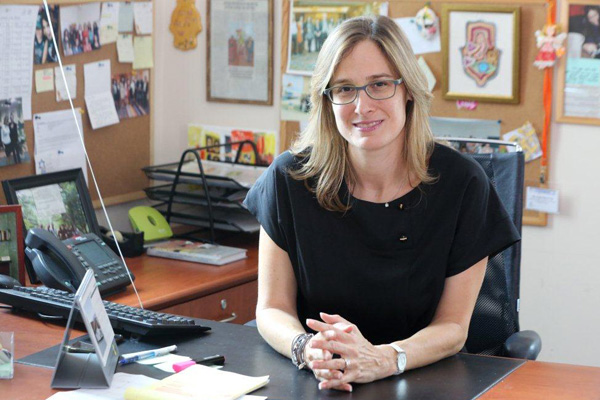For the past eight years Equal Employment Commissioner Tziona Koenig-Yair has fought dozens of employers discriminating against minorities, rolled out creative new tools for fighting the gender wage gap, and much more. In an interview with +972, she discusses affirmative action, the role of societal racism in the labor market, and her hopes for equal opportunity in Israel.

Israel has identified more grounds of discrimination in the workplace than any other Western country — 16 in total. It’s not clear if that means Israel is extremely progressive in recognizing vast types of discrimination or if the labor market just reflects the country’s many entrenched social hierarchies.
Despite Israel’s myriad social and political divisions, workplace equality would seem to be a pragmatic and possibly even a bipartisan policy goal. The Left tends to support equality from a moral standpoint, and the Right could support workplace equality based on liberal economic values – but also for the benefit of international optics (“hasbara”).
And yet, Israel’s workforce is an arena where every single unresolved contradiction and conflict of Israeli life is playing out.
I sat down last week with Tziona Koenig-Yair, the country’s first-ever “equal employment opportunity commissioner.” For eight years, she has fought to change structural inequalities from within the government, a challenge that is either herculean or Sisyphean — it’s not always clear.
Speaking softly but extremely fast, Koenig-Yair explains that some forms of discrimination have hardly any objective measure. Koenig-Yair cites the case of an Ethiopian-Israeli who was not accepted for a job because, the interviewers said aloud, “we don’t want someone of that background.” A person with a Mizrahi-sounding name was rejected for a job interview, then offered one immediately after re-submitting his CV using an Ashkenazi-sounding surname. A would-be employer wrote that the rejected interviewee looked “fairly slutty and dark.”
But such clarity is rare.
In order to better understand where its attention is most needed, the Equal Employment Opportunity Commission (EEOC) conducts surveys tracking both employer and employee perceptions of discrimination. Those findings are not always intuitive.
For instance, Arabs employed by Arabs report more workplace violations than those employed by Jews. An EEOC survey of the whole population found that older people perceive the greatest discrimination in the workforce (86 percent), followed by mothers of small children, and only then Arabs; Mizrahim report nearly the lowest level of discrimination (47 percent), just above army reservists. Interestingly, employers’ perceptions were very similar to employees’ — except for women and Mizrahim. Far fewer employers than employees perceive discrimination against those groups.

Where’s a commissioner to start?
Koenig-Yair is originally from Brooklyn and studied at the Yeshiva of Flatbush until her family moved to Israel when she was 11 years old. She grew up religious, “and to some extent I still am,” something that always surprises people, she says. Her appearance bears no drama; her personality is no nonsense.
When Koenig-Yair gets worked up, she thumps on the desk and leans forward with a piercing glare. During our meeting, she keeps a running email conversation with her staff to request pieces of data we are discussing, or calls them in to her office. She answers calls only from her daughter: “Nogoosh?”
Koenig-Yair was no newcomer to equality issues when the commission was established. An attorney with a law degree from Hebrew University, she worked for eight years at the Israel Women’s Network, a veteran organization advocating for women’s equality.
The legal department there had for years considered the establishment of a human right commission in Israel. “We realized there wasn’t really a political constellation to do that,” she says, diplomatically. The conversation turned to equality in the workplace, she recalls. In the mid-2000s, lobbying efforts and draft legislation reached the then-minister of industry, trade and labor, Ehud Olmert, who had designs on becoming prime minister. He promised to support the bill, she says, but only on the condition that the commission be established in his ministry.
The legislation passed on the last day of the Knesset in 2006 and Koenig-Yair was appointed to build the commission. In 2008, she recalls of the first days, “I had a computer. No personnel, no [formal] vision, goals, work plan, nowhere to call. I was establishing it from scratch; it was tabula rasa.”
A colleague told her: “’Tziona, leave now. You have a great reputation, but you won’t be able to get anything done in government. Leave now,’” she recalls.
Instead, she gathered outside experts and initiated a two-year EU twinning project with a Northern Ireland commission. She defined goals and got to work.
Eight years later, she does not boast but cannot restrain her pride. The Commission has handled over 5,000 requests for help and litigated 69 cases. It has won powerful precedents. In Abdulkarim v. Israel Rail, employees sued Israel’s national railroad company for listing IDF service as a requirement for positions they already held, and then firing them (most Arabs do not perform army service). The company removed IDF service as a qualification, and replaced it with requirements so specific that a only soldier would have them. With the EEOC’s legal opinion, the court ruled that those terms together amounted to discrimination against people who have not served. The employees were reinstated.

“We have been quoting that case for five years,” she says. “We’ll write to employers and say, you’re using army service as a requirement for employment, which is illegal, and look at this precedent. They change the criteria right away.”
The Commission also works on affirmative action, but its positions are not necessarily what you might expect. Israel has long had quotas in the public sector for women, Arabs, Ethiopian-Israelis and people with disabilities, but the issue is evolving. Unsurprisingly, Koenig-Yair has strong opinions. Populations ought not to get affirmative action if their underrepresentation isn’t due to discrimination, like ultra-Orthodox Jews — or if they are not underrepresented at all.
“Affirmative action is supposed to fix something,” she says, wielding the laser gaze. “Affirmative action in the public sector for people who have done the army is one of the worst propositions I’ve ever heard. All the people in public sector have done the army. They don’t need affirmative action.”
She is particularly excited about progress on the gender wage gap. Central Bureau of Statistics data from 2014 shows that women in Israel earn two-thirds of men’s income, on average. Hana Kupfer, the EEOC’s research director, observes that there has been a modest decline over the last decade. But over the last three years, there has also been a major rise in awareness. Nearly 80 percent of women now know there is a gap, according to the EEOC’s surveys.
The commission also recently launched an Internet tool for employers to use anonymously to calculate their own gender pay gaps, intended to encourage self-enforcement of wage equality. One thousand employers have used it in the six months since it went live, and thousands more have visited the website. And the Commission has been involved in an effort to have all government offices analyze their budget to consider the gender impact – “that’s revolutionary!”
Overall, Koenig-Yair believes that the discourse around workplace inequality has changed in the media, the Knesset and that even the government increasingly defines goals reflecting greater awareness. Compared to eight years ago, “it’s a whole different ball game.”
Still, obstacles abound. Koenig-Yair is aware that despite the fact that over 80 percent of Arabs in their surveys feel discrimination in the workforce, just a small portion of incoming requests are from Arabs. On the upside, since 2013, the proportion of requests received from Arabs has tripled, from 3 to 9 percent, and is rising annually. The EEOC’s survey this year found that nearly 40 percent of Arab respondents know about the EEOC.
And yet other problems are not improving, but deepening. If workforce equality was “a hard sell” in previous years, Koenig-Yair feels it was ultimately acceptable within the halls of government. There has generally been a “semi-consensus” around work equality issues in government, she says. “We want everyone to be economically independent.”
But the rising tide of racism and political persecution in Israeli society is also reaching the workforce. After the last war in Gaza, the Commission first encountered people being fired for their political views. I ask if there is general a rise in discrimination based on political outlook or party affiliation and she says “yes” before I have finished the question.
Government policies and attitudes in society cannot be divorced from workplace issues, she explains. “There is a direct correlation – the more the government commitment there is to equality in general, the more it will benefit the workplace.”
But that sounds a bit optimistic at a time when top Israeli leaders are legitimizing and participating in political persecution, a far cry from embracing an agenda of equality.
Political instability doesn’t help either. She has worked under five different ministers in eight years. All of them were men. How did that jive with their extensive focus on gender issues? “Some would say we focus a lot on Arab issues,” she answers.
Wednesday was Koenig-Yair’s last day, and her idea of taking a break is to lead a training course at Harvard. She is not yet sure what she’ll do next, but it will probably still involve public issues.
The next commissioner has not yet been chosen, and she hopes it will be a professional choice, rather than a political appointment. The budget is largely secured, but the minister of economy and the justice minister have the final say over the person. The latter is Ayelet Shaked, from the far-right Jewish Home party. The minister of economy is Benjamin Netanyahu.
So does she think the next commissioner will be committed to moving the needle, or able to? “I have to hope,” she says. As she expands her answer, she repeats the phrase “I hope, I hope,” several more times.

